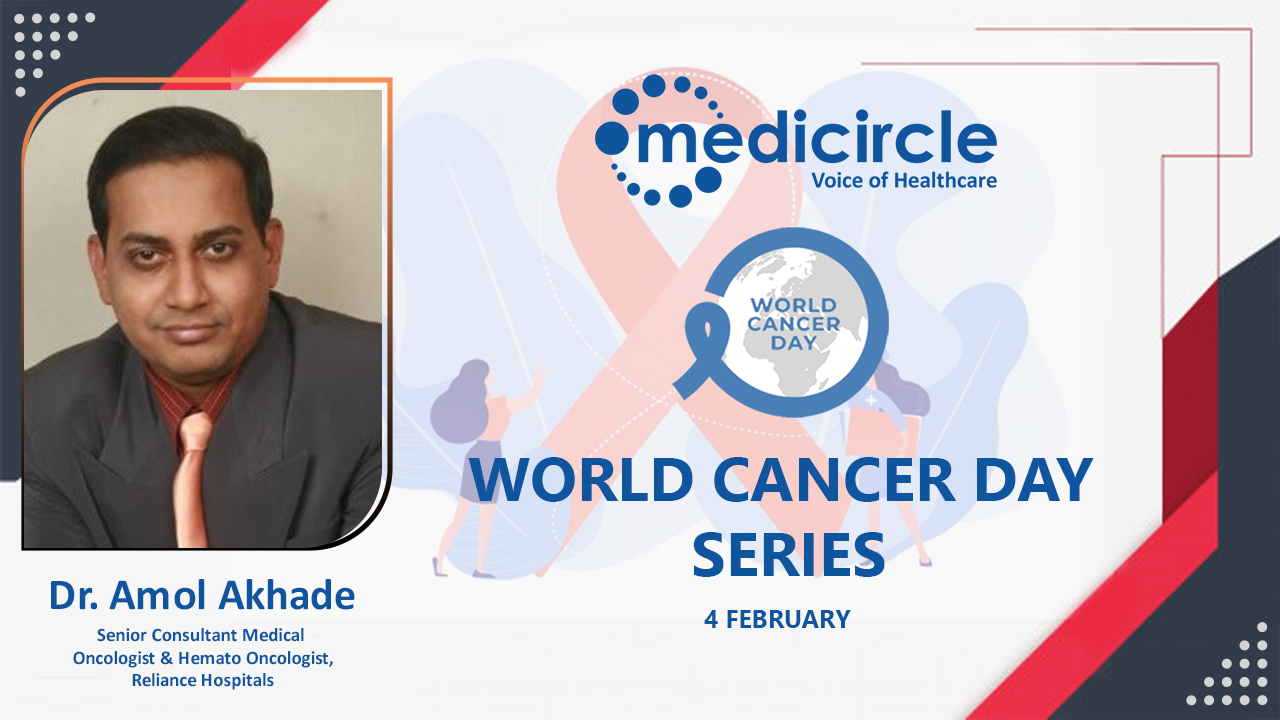A WHO study confirms that 1 in 10 Indians will develop cancer during their lifetime. According to a report by ICMR published in August 2020, the no. of cancer cases in India is estimated to be over 13lakhs and may increase to 15.7 lakhs by 2025 with prevalence being marginally higher in men. At a time when advanced treatment is available and the disease to a large extent is curable, this data shows a throbbing need for awareness among people. Medicircle is conducting an exclusive cancer awareness interview series showcasing the opinions and guidance of eminent oncologists so that people get aware of causes, treatments, and myths related to cancer.
Dr. Amol Akhade is a Senior Consultant Medical Oncologist, Hemato-Oncologist and Bone Marrow Transplant Physician. He is associated with Reliance Dr L H Hiranandani Hospital Powai, Bethany Hospital. Thane and Godrej Hospital. He started the Department of Medical Oncology at TNMC Medical college [ Nair hospital ] and has been running an of its kind chemotherapy ward for the last 7 years. Dr Amol has recently started a chain of cancer chemotherapy clinics - Suyog Cancer Clinics at Thane. His aim is to offer good and affordable chemotherapy care to all sections of society.
Suyog Cancer Clinics is a unique Cancer Speciality Day Care Centre, where a team of Medical Oncologists & Onco-Surgeons jointly plan treatments and treat cancer patients.
Healthy Lifestyle is the Key
Dr. Amol stresses on the importance of following some important lifestyle guidelines. He says there are 3 simple steps to it:
Eat proper nutritious food, Do some form of exercise daily Take adequate sleepThe problem for most of us living in urban India is that we can not follow these simple things due to a self adopted hectic lifestyle’’ he says.
Genome studies are good tools provided they are handled properly
According to Dr Amol, ‘‘Genome studies for cancer are good tools provided they are handled properly. The intent of such a test should be to search for actionable mutation for that particular patient’s cancer cells. Now actionable mutation means the one against which there is effective treatment available. But the number of such mutations are less. We have a genome test available commercially which detects hundreds of mutations for which there is no treatment available and hence they do not add any value for patient treatment,” Dr. Amol informs.
Tips for ensuring cost-effectiveness of Genome tests
Dr. Amol suggests:
“The treating doctor must know which test to order and which not to Not all labs which do such testS are good at quality control and hence for the test to be cost-effective, the doctor must know which lab is indeed good in doing these complex tests and which ones are not,’’ he says.
Blind adaptations to western lifestyle should be avoided
Dr. Amol observes, “The incidence of cancer in India is still less compared to the rest of the western world. But yes, it is slowly rising. And the reason is a blind adaptation of western lifestyle and dietary pattern:
We feed our body with loads of junk foods, aerated drinks from childhood We hardly have time to exercise daily We have increasing pollution levels with bad air quality in the major metro cities due to improper urbanisation We have forgotten our old tradition of sleep early and wake up early Our circadian rhythms are badly skewed. We have too many pesticides in vegetables and fruits.Not all of these can be tackled at an individual level” Dr. Amol says.
How to Prevent Cancer
Dr. Amol suggests, 5 simple steps that one can adopt as precautionary measures of cancer:
Avoid Junk foods and aerated drinks {instead have Lassi or Chach or other traditional Indian drinks and Indian snacks like poha or dosa etc ] Say no to tobacco in all forms (smoking in women is more rampant in metros and it is too dangerous for a woman’s health) Go out for a walk daily. That’s the best form of simple and effective exercise Do intermittent fasting { Our tradition of fast has a scientific basis and intermittent fasting leads to detoxification and is good for getting rid of carcinogen that gets formed in the intestine } Have more of a RAINBOW diet. Have more colourful fruits and vegetables,” he says
(Edited by Faryal Siddiqui)

 ‘‘Technically we are yet not into the post-Covid 19 world.. Pandemic is slowly weaning off especially in India but still, the risk of the second wave due to mutant virus remains. If we want an overall healthy life then we must try to adopt a healthy lifestyle’’ says Dr. Amol Akhade, Senior Consultant Medical Oncologist, Hemato-Oncologist and Bone
‘‘Technically we are yet not into the post-Covid 19 world.. Pandemic is slowly weaning off especially in India but still, the risk of the second wave due to mutant virus remains. If we want an overall healthy life then we must try to adopt a healthy lifestyle’’ says Dr. Amol Akhade, Senior Consultant Medical Oncologist, Hemato-Oncologist and Bone 









.jpeg)

















.jpg)


